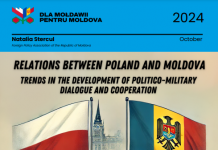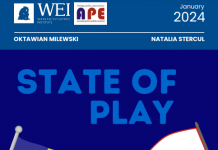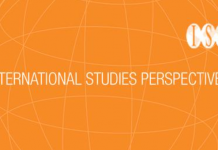To access this report please click here.
EXECUTIVE SUMMARY AND RECOMMENDATIONS
Resolving the Trandniestrian secessionist dispute in Moldova is vital to remove a potential source of chaos on the periphery of the expanding European Union, to implement an important part of the post-Cold War settlement, and to make Moldova itself a more viable state. Greater U.S. and EU engagement with the stalled peace process is essential to bring a settlement to this impoverished and unstable part of Europe.
Russia‘s support for the self-proclaimed and unrecognised Dniestrian Moldovan Republic (DMR) has prevented resolution of the conflict and inhibited Moldova’s progress towards broader integration into European political and economic structures. In its recent and largely unilateral attempts to resolve the Transdniestrian conflict, Russia has demonstrated almost a Cold War mindset. Despite comforting rhetoric regarding Russian-European Union (EU) relations and Russian-U.S. cooperation on conflict resolution and peacekeeping within the Newly Independent States of the former Soviet Union (NIS), old habits appear to die hard. Russia remains reluctant to see the EU, U.S. or the Organisation for Security and Cooperation in Europe (OSCE) play an active role in resolving the conflict because Moldova is still viewed by many in Moscow as a sphere of exclusively Russian geopolitical interest.
It has not been difficult for Russia to exploit Moldova’s political and economic instability for its own interests. Despite having accepted concrete deadlines for withdrawing its troops, Russia has repeatedly back-pedalled while trying to force through a political settlement that would have ensured, through unbalanced constitutional arrangements, continued Russian influence on Moldovan policymaking and prolongation of its military presence in a peacekeeping guise. It has so far been unwilling to use its influence on the DMR leadership to promote an approach to conflict resolution that balances the legitimate interests of all parties.
Ukrainian and Moldovan business circles have become adept at using the parallel DMR economy to their own ends, regularly participating in re-export and other illegal practices. Some have used political influence to prevent, delay, and obstruct decisions which could have put pressure on the DMR leadership to compromise. These include abolition of tax and customs regulations favourable to the illegal re-export business, enforcement of effective border and customs control, and collection of customs and taxes at internal "borders".
With backing from Russian, Ukrainian and Moldovan economic elites, the DMR leadership has become more assertive. Recognising that international recognition is unlikely, it has focused on preserving de facto independence through a loose confederation with Moldova. Unfortunately, DMR leaders — taking advantage of contradictions in the tax and customs systems of Moldova and the DMR — continue to draw substantial profits from legal and illegal economic activities including re-exports, smuggling and arms production.
The DMR has become a self-aware actor with its own interests and strategies, possessing a limited scope for independent political manoeuvre but an extensive web of economic and other links across Russia, Moldova, and Ukraine. However, it remains heavily dependent on Russian political and economic support and does not like to put itself in a position where it must act counter to Russian policy. Russian and DMR interests often overlap but in some instances DMR leaders have been able to design and implement strategies to avoid Russian pressure, delay negotiations, obstruct Russian initiatives, and undermine Russian policies by playing up disagreements between the co-mediators and capitalising on alternative sources of external support.
Russia‘s most recent attempt to enforce a settlement — the Kozak Memorandum in October and November 2003 — has shown that its influence, while pervasive, has clear limits. Russia is unable to push through a settlement without the support of Moldova and the international community, especially key players such as the OSCE, EU, and the U.S. A comprehensive political settlement requires an approach that can bridge the differences between Russia and other key international actors while fairly considering the interests of both the Moldovan government and the DMR.
Despite an understanding that Russia should not be antagonised, the gravitational pull of European integration is strong in Moldova. Recently, even its communist leadership has stressed the need to do more to achieve that goal. The country has rarely been on Western radar screens during the last decade, however, and it will need more demonstrable EU and U.S. backing if it is to resist Russian political and material support for the DMR and Transdniestrian obstruction of the negotiation process. International actors must also help Moldova to secure its own borders against the illicit economic activities which keep Transdniestria afloat and affect its European neighbours as well.
The conflict can only be resolved if the international community uses its influence on Russia bilaterally and within the OSCE. Only then, and with a substantially more determined commitment to political, economic and administrative reform on its own part, will Moldova be able to realise its European aspirations. A comprehensive strategy towards Moldova, Ukraine and Russia within the EU’s Wider Europe Policy would be a critical first step.
RECOMMENDATIONS
To Moldova:
1. Control the internal traffic of goods from Transdniestria by collecting taxes and customs duties at internal mobile and stationary customs posts on all transport routes until joint Ukrainian-Moldovan posts are set up and invite international observers to help monitor and police the border with Ukraine.
2. Develop effective anti-corruption programs for customs, border guard, and tax services, and police.
To the authorities of the "Dniestrian Moldovan Republic":
3. Engage in constructive dialogue with the OSCE and the government of Moldova.
To Russia:
4.Withdraw troops from Moldova in line with international commitments.
5. Agree with Moldova, the OSCE and EU on deployment after the troop withdrawal of a modest international peacekeeping and/or policing operation with participation of forces from the Commonwealth of Independent States (CIS) and from elsewhere, under OSCE supervision.
6. Offer a partial write-off of both Moldovan and Transdniestrian gas debts as an incentive element in the eventual settlement.
7.Exert political and economic influence on the DMR leadership to accept a reasonable political settlement and work with the OSCE, EU and U.S. to implement financial sanctions on the DMR leadership.
To Ukraine:
8. Crack down on smuggling to, from and through Transdniestria by agreeing to establish joint customs posts with Moldova — on Moldovan territory in areas controlled by Moldova and on Ukrainian territory between the Ukraine and the DMR.
9. Develop effective anti-corruption programs for the customs, border guard and tax services, as well as police.
To the OSCE, EU and the U.S.:
10. Press Ukraine, as part of its accession process to the World Trade Organisation, to agree with Moldova on joint customs posts as outlined above.
11. Urge Moldova and Ukraine:
a)to invite international observers to the Transdniestrian-Moldovan controlled sections of theUkrainian-Moldovan border to ensure transparency about the flow of goods across this border; and
b)to task these observers not only with monitoring application of relevant customs procedures and collection of duties and taxes, but also with assisting in patrolling the unmarked border and combating smuggling and re-exports.
12. Work with Russia, bilaterally and within the framework of the OSCE, to coordinate its mediator role within the existing five-sided negotiation format.
To the U.S. and EU:
13. Continue to make the ratification of the adapted Conventional Armed Forces in Europe (CFE) Treaty conditional on the complete withdrawal of Russian troops from Moldova.
14. Support Ukraine and Moldova, through the relevant EU Action Plans and within the framework of the OSCE, to develop effective anti-corruption programs, particularly within the customs, border guard and tax services and police.
Chisinau/Brussels, 17 June 2004






